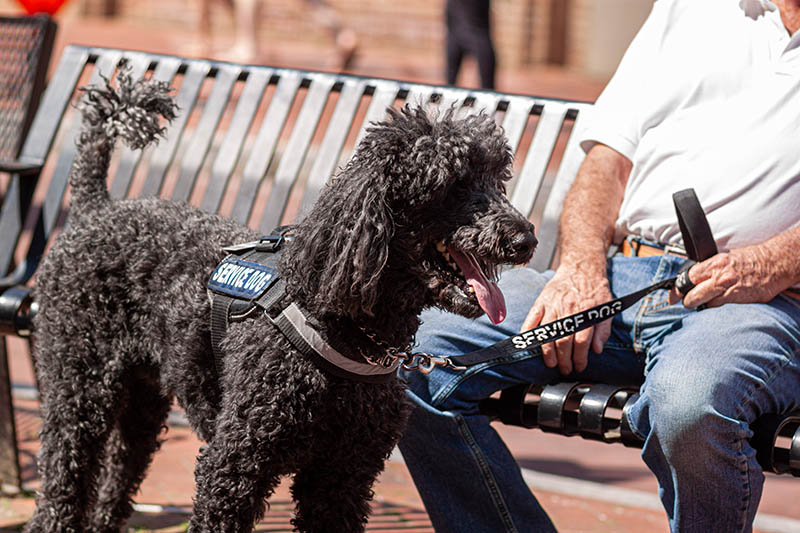Why is My Puppy Sleeping So Much? 6 Vet-Reviewed Reasons

Updated on
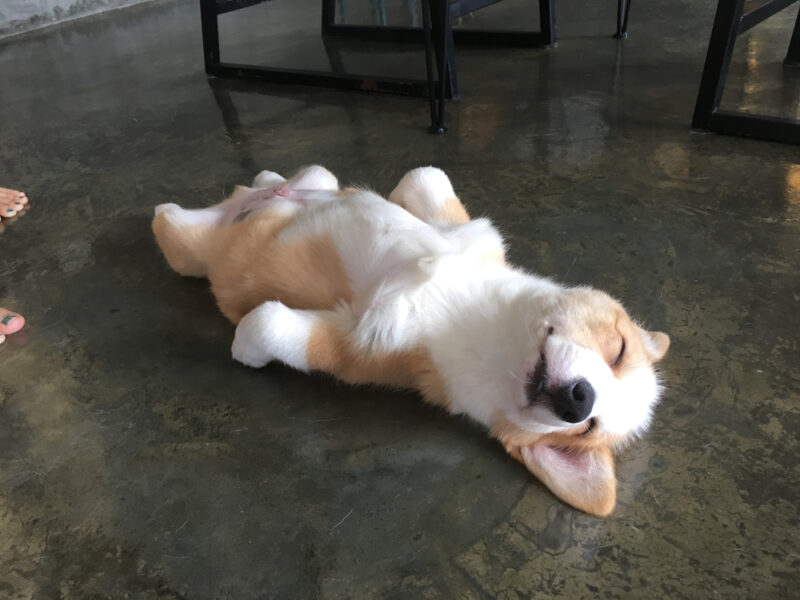
A sleeping puppy is one of life’s most heart-warming sights, but it may seem like that’s all they do in the beginning! You can only watch your pup sleep for so long until the urge to wake it up almost takes over. So why is it that puppies sleep so much?
It is normal for puppies to sleep most of their day away as they are growing incredibly fast, experiencing new senses, and using up a lot of energy while awake. Sleep helps them recharge and process all the new things they are experiencing, but there may be instances where too much sleep may indicate a health issue.
How Much Sleep Does a Puppy Need?
Puppies need a lot more sleep than adult dogs, much like babies. A typical young puppy can sleep for 16 to 20 hours per day. That is a big portion of the day, which indicates that sleeping is their primary activity. If your puppy doesn’t get enough sleep, they can become sleep deprived. Every puppy is unique, so you must learn to let yours rest so that they can grow and develop properly. Finding out how much sleep your dog typically needs can be helpful because some breeds may need sleep more than others.
It’s important to keep in mind that sick dogs tend to sleep more than usual, so pay attention if your puppy suddenly starts napping more. Lethargy can be one of the first signs of illness, so a trip to the vet is essential if your puppy’s sleeping times suddenly increase. No one will understand your pet as well as you do, and any behavioral changes may be crucial indicators that your puppy requires veterinarian care.
These are the most typical reasons your puppy sleeps so much:
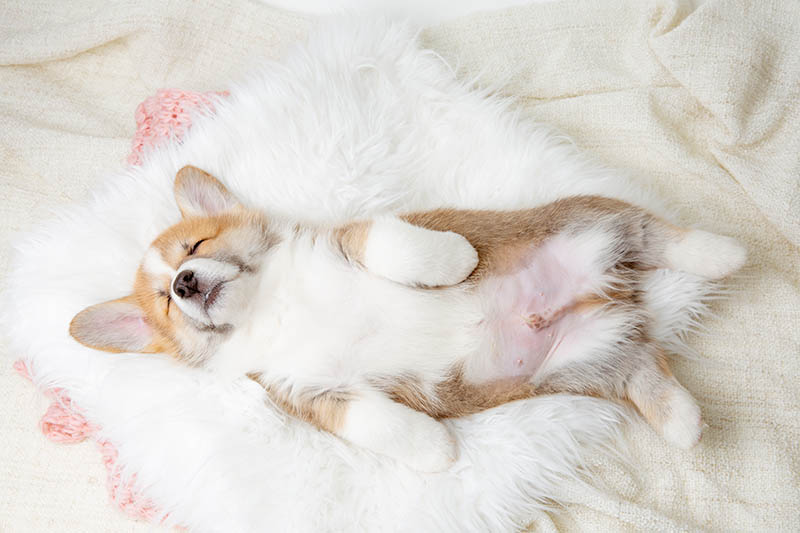
The 6 Reasons Puppies Sleep So Much
1. Growing Takes Energy
Puppies will sleep most of their days away because growing takes a lot of energy! There is so much rapid change going on as your pup grows mentally and physically, which uses up your pup’s energy resources. Every bone is growing, and to achieve balanced growth, the soft tissues have to grow at a rate comparable to that of the bones. As your pup grows, their bones change in both size and shape. The central nervous system also has to work hard to control and coordinate movement.
You will notice the rapid growth, particularly between 3–6 months, and you will begin to notice that their sleeping habits may begin to change as well. Puppies have nearly tripled their birth weight by the time they reach the late teen stage, which lasts between 6 months and a year.
It continues to develop long after your pup turns one, though it slows down considerably. At this time your pup’s sleeping time normally reduces to approximately 12 hours, but there will be plenty of extra resting periods during the day.
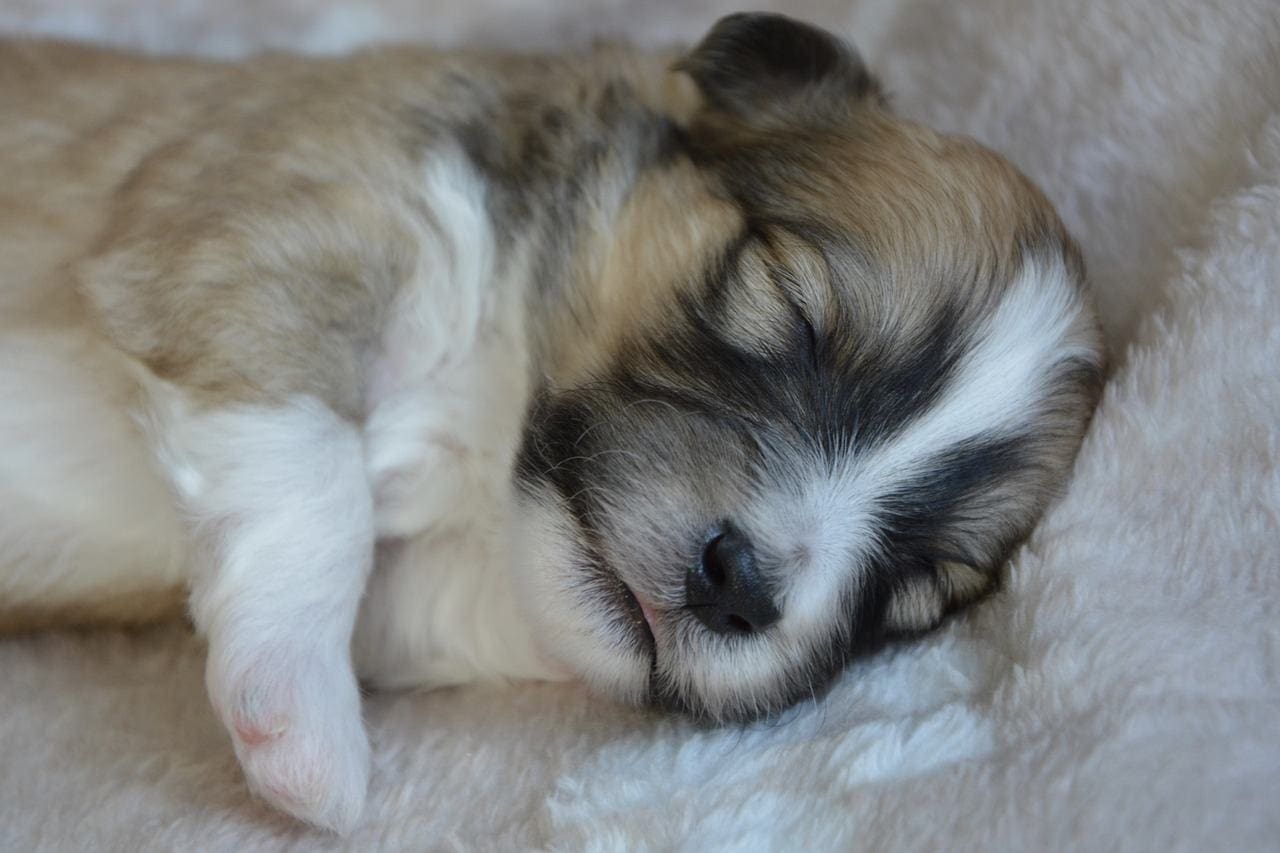
2. Changes in Your Puppy’s Activity Levels
Your puppy’s activity levels may change from day to day, and some days, they may use up more energy than others, requiring more rest. There may be a day when your puppy has played hard or has learned a lot more, they stayed up the night before and they’re now feeling more tired.
It’s helpful to compare a puppy to a baby sometimes. Babies also sleep a lot as they are growing, and if they have had an eventful day with lots more visitors or went out with their mom to meet a friend for coffee, they will typically sleep more on their next nap.
3. Disruption in Sleep Schedule
If your puppy’s sleep schedule has been disrupted, they will certainly need to catch up, as they may feel sleep-deprived. Sleep schedule disruptions can include interruptions at nighttime, a late arrival of someone in the home, or unusual noises keeping it awake. If you had visitors during the day and they were eager to play with your pup, it could have interrupted sleep time. This can happen easily when there are kids around that just want to play and cuddle with their new puppy. A sleeping puppy must be left to sleep in a quiet and undisturbed part of the house.
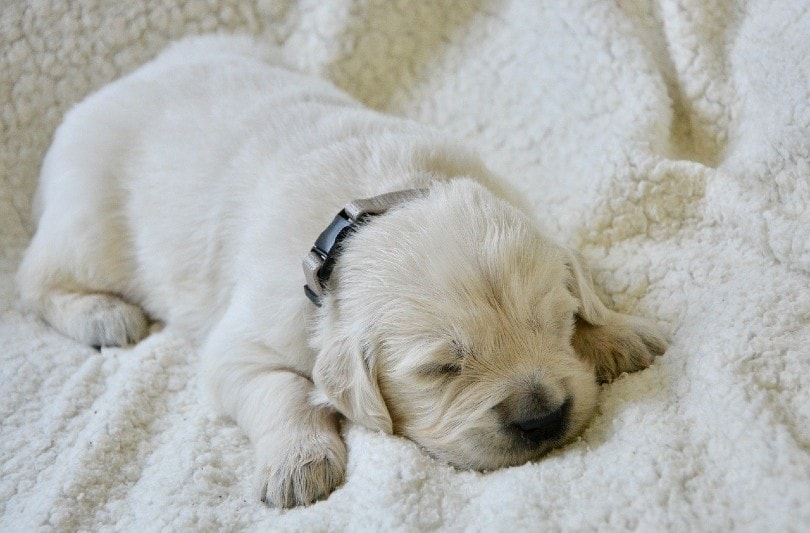
4. The Weather
The weather could play a small role if your puppy sleeps a lot or more than usual. When it’s hot outside, pups can become more tired. They may become more lethargic and sleep for longer under hot conditions.
On the other hand, when it’s chilly outside, your puppy may want to cuddle up in their comfy bed, which may result in longer naps.
5. A Trip to The Veterinarian
As your puppy grows, you will have to visit your vet several times for routine health checks. These visits can make your puppy feel exhausted on their return home since this usually involves a car trip, new faces, lots of cuddles, a thorough physical exam, parasite medication, and vaccines as well! Puppies have maternal antibodies from their mother when they are first born, and they continue to get more from her milk. These antibodies shield your puppy from common diseases in the first few weeks of life and wear off after a short period. Your puppy will start producing their own antibodies thanks to the vaccines your vet administers them.
They need energy to boost their immunity and to recover from such an exciting event.
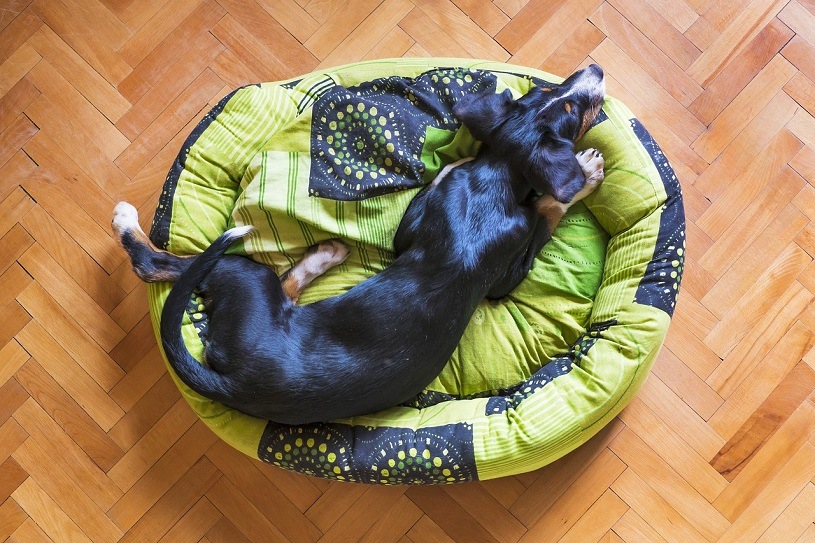
6. Efficient Digestion
Nutrient absorption are essential for development, and puppies must absorb as much nutrition from their meal to promote their growth. Digestion is more efficient when your puppy rests since it also takes up a lot of energy.
Because a puppy’s digestive system is still developing, their food should be very easily broken down to minimize gastrointestinal distress or upset. Foods created especially for pups will be rich in nutrients that provide energy, such as protein and fat, making them naturally easier to digest.
Is My Puppy Sick or Just Tired?
Now you understand that it is normal for your puppy to sleep for long periods, but sometimes your puppy may sleep more than usual, which can indicate a health issue. So how do you tell if your puppy is tired or sick and needs veterinary care?
Your puppy may not be healthy if they don’t play with their littermates or they aren’t curious about their new environment. You need to see a vet if your puppy lacks interest and seems more lethargic.
For the most part, mild diarrhea in an otherwise healthy puppy might be common, especially if they just changed their diet. However, if your puppy is acting unusually fatigued or if you notice other unusual behaviors, you should schedule a vet visit. Your puppy may also be ill if their coat loses its sheen or becomes patchy, they aren’t eating as much as normal, are having difficulties keeping food down, and are losing weight.
A puppy that is typically bright and energetic may suddenly become quiet and unresponsive if they’re sick. They may also become suddenly more vocal and whine more often if they aren’t right.
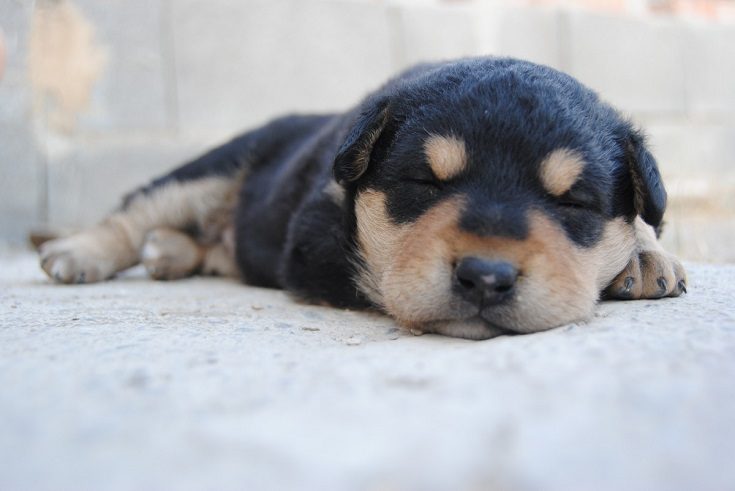
How to Tell If Your Puppy is Sleeping Too Much
It’s important to observe how your puppy is when they’re awake and monitor how much they generally sleep during sleep time. That way, you can easily tell when your puppy is sleeping more than usual. If your puppy is energetic, responsive, playful, and hungry while awake, they’re probably catching up on some sleep due to the reasons we mentioned before.
However, if your puppy is still tired and seemingly uninterested during their awake time and wants to fall back asleep, it may indicate a more serious problem, and it may be time to see your vet.
Creating a sleep schedule for your pup can help ensure they get enough sleep and will help you monitor and track their sleep cycle. Here is how you can create a healthy sleep schedule:
- Designate a quiet and comfortable sleep area for your pup.
- Make sure the whole family knows they should not disturb that area.
- Consider a crate with a comfy bed and blankets draped over the top to reduce light.
- Familiarize your puppy with this area by giving them treats while they’re there. This uses positive reinforcement to associate their sleep area with something positive.
- Establish regular times for waking up in the morning and going to sleep at night.
- As your puppy ages, change the routine to fit their needs. They will need less sleep and have more energy, so naps will become shorter and less frequent.
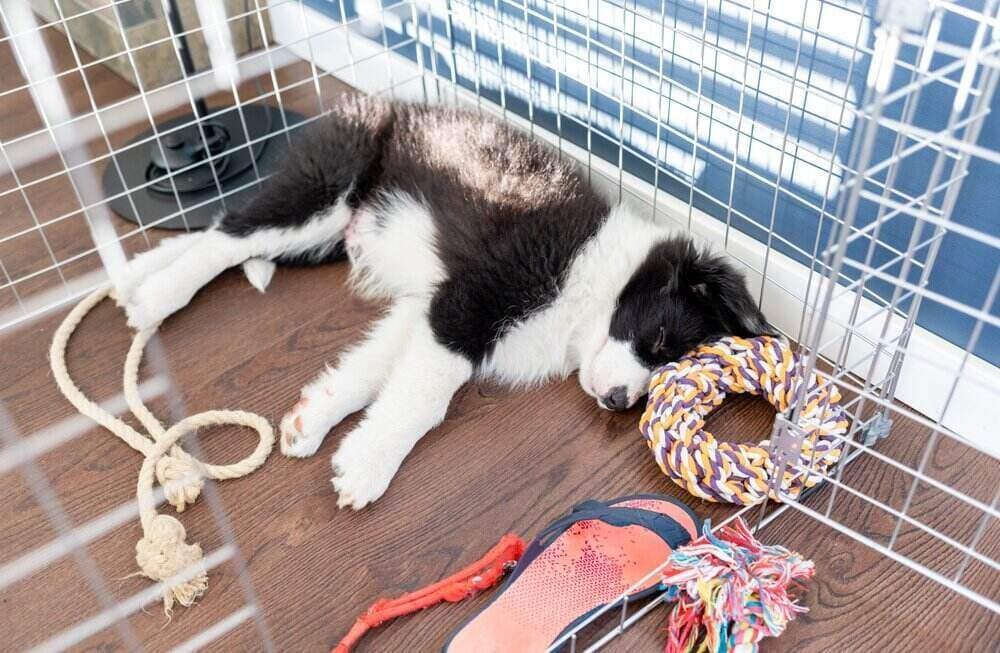
Conclusion
It is normal for puppies to sleep so much, at least 16 hours a day! If you compare them to babies, they are very similar in the amount of sleep they need. They sleep a lot because they are growing so rapidly. Their bones and immune systems are developing, and as they learn and explore, their brains are growing too.
Puppies may also sleep a little more than usual if their activity levels increase, their sleep cycle is interrupted, or the weather has changed. As long as your pup is energetic and engaging during their awake time, there is no need to worry about them sleeping so much, as long as they follow a pattern. However, if your dog is lethargic and less playful during awake time and presents other worrying signs such as loss of appetite, vomiting, diarrhea, trouble breathing, coughing, or any other abnormal signs, you should see your vet immediately.
Featured Image Credit: CWR, Shutterstock



